(VOVWORLD) -Vietnam has submitted a dossier to seek UNESCO recognition for Cheo, Vietnamese traditional opera, as an Intangible Cultural Heritage of Humanity. This is a good opportunity to promote Vietnamese folk art to the world and make the community aware of the need to preserve Cheo. To that end, Vietnam is diversifying performances of contemporary Cheo and inspiring young people to get involved in this art form.
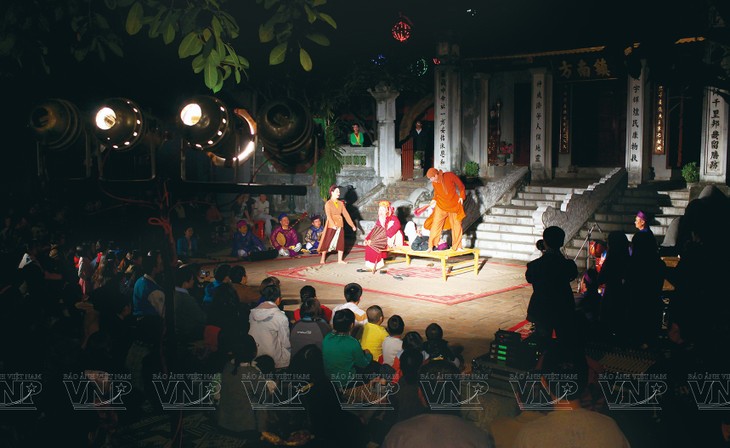 A Cheo performance at Kim Lien communal house yard (File photo by VNP) A Cheo performance at Kim Lien communal house yard (File photo by VNP) |
The growing popularity of new forms of entertainment has shrunk the audience for traditional art forms. To revive Cheo, in recent years, artists have tried to move the genre closer to the tastes of contemporary audiences. On weekend evenings, people walking around Hanoi’s Hoan Kiem Lake often encounter buskers performing traditional Vietnamese arts.
Xam Ha Thanh, a Hanoi singing group, performs traditional music near the Statue of King Ly Thai To. The Hanoi Drama Theater performs scenes or short plays in front of the Cong Nhan Theater. The Hanoi Cheo Theater stages Vietnamese folk performances in front of the Ba Kieu temple. And the Thang Long Puppet Theater often stages songs, dances, and puppet shows in front of its Old Quarter theater.
Chi, a young person from Ba Dinh district, said, “I find this cultural space very special. Artists perform Cheo plays on a mat, with musicians sitting on either side of the mat. Sitting in the front row makes me feel very close to the artists. It’s exciting."
In addition to performing in the walking streets around Hoan Kiem Lake, Cheo artists collaborate with the Cheo 48h Club, a group of young people dedicated to Cheo who bring performances to different stages.
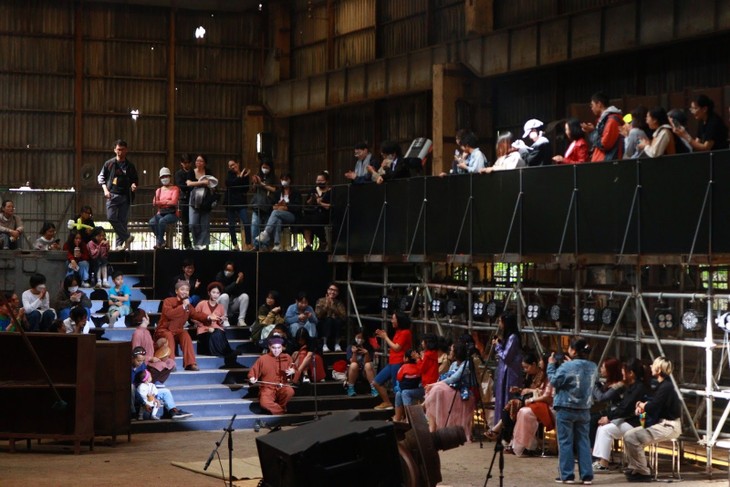 A traditional art performance at a workshop for repairing train carriages at the Gia Lam Train Factory (Photo: Thuy Tien/VOV) A traditional art performance at a workshop for repairing train carriages at the Gia Lam Train Factory (Photo: Thuy Tien/VOV)
|
Nguyen Van Phuong, an artist with the Vietnam Cheo Theater, says he’ll never forget the feeling of performing at a workshop for repairing train carriages at the Gia Lam Train Factory during the 2023 Hanoi Creative Design Festival.
He admitted that at first, he felt a bit special because the performance area was surrounded by iron, steel, and train wheels. As it was a round stage, the audience could watch the artists perform from all sides and the actors could interact with all the viewers. The performance combined modern and traditional folk elements.
“If there were more venues like that, artists would have more opportunities to show off their talent, and interact with and bring their art closer to the public,” Phuong said.
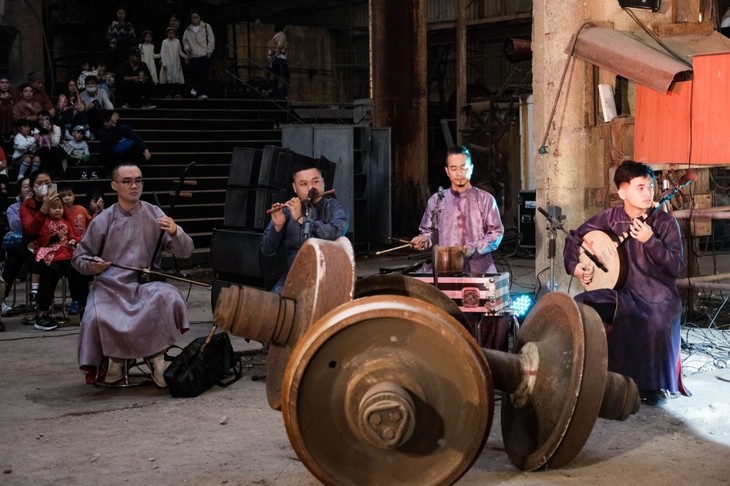 (Photo: Thuy Tien/VOV) (Photo: Thuy Tien/VOV) |
At open performance spaces like the workshop for repairing train carriages, the audience can enjoy traditional Cheo melodies and are taught how to sing the lyrics and perform the gestures of the characters in Cheo plays.
Ngoc, a lecturer at Hanoi Architecture University, commented,“Cheo is a very meticulous and delicate art form. When you watch from afar, you only hear the sound. But if you watch at a nearer distance, you see every facial expression, gesture, and step, all of which require hours of intense practice.”
Or as Lan Anh of Bac Tu Liem district said after getting to try singing and performing some Cheo melodies that made her feel new emotions. “I became completely immersed in traditional cultural values. That was a worthwhile experience that every young person should try once,” said Lan Anh.
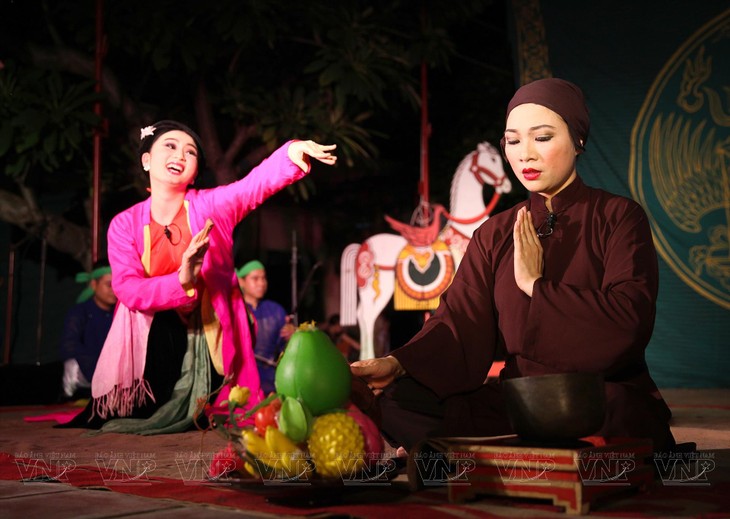 Excerpt of the “Thi Mau Len Chua” (Thi Mau visits the pagoda) play (Photo: VNP) Excerpt of the “Thi Mau Len Chua” (Thi Mau visits the pagoda) play (Photo: VNP)
|
Young artist Tran Ngat, an actor with the Vietnam Cheo Theater, said that performing on different stages improves a performer’s skills, nurtures artistic passion, and brings artists closer to the public.
She added, “Now we can watch Cheo plays on different stages, at special venues, not just in theaters or on YouTube. Artists like me can get closer to the audience and the art can become more familiar to the audience.
“As a young artist, I feel the art of Cheo is recovering. The vitality of Cheo should never be lost. We just don't know how to approach the audience, or what to do to attract more people to Cheo. Once they experience Cheo, I'm sure they’ll love it,” Ngat noted.
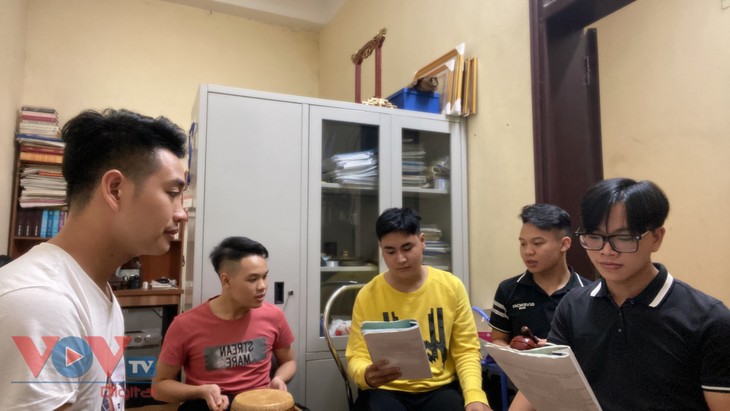 Members of the Cheo group gathering young artists in Nam Dinh province (Photo: VOVTV) Members of the Cheo group gathering young artists in Nam Dinh province (Photo: VOVTV) |
Inspiring young people to get involved in Cheo is a crucial way to maintain the art form and popularize it. A number of young artists in Nam Dinh province have formed an art troupe to perform classical works of Cheo. The group has brought Cheo to a wider audience through social media. The troupe was founded in 2022 by Lại Thanh Minh, an artist from Nam Dinh province’s Traditional Arts Theatre.
Without a big stage or elaborate costumes, the group produces video clips of their performances in a small room and then posts them on social media. Their clips have received thousands of likes and comments and are widely shared on Facebook, said Minh.
“I had the idea of gathering some of my students to produce Cheo video clips and post them on social media to bring this art form to the public during the pandemic. We don’t use elaborate costumes because we think it’s easier to reach the audience if we present Cheo in a simple way,” Minh recalled.
Most of the group members are students at the Hanoi Academy of Theatre and Cinema. Pham Quoc, a first-year student, says, “Cheo is a unique art form imbued with human values, life lessons, and Vietnamese identity. I’ll do my best to preserve and promote it.”
Cheo veteran artist Doan Thanh Binh praised the group’s skills and the popularity of their Cheo video clips. “Despite being first-year students, they sing very well. It’s not easy to perform Cheo but they have talent and a great passion for this art form. Those youngsters have helped preserve Cheo,” said Binh.
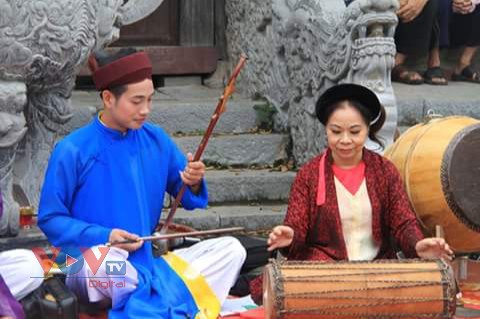 Artist Lai Thanh Minh (Photo: VOVTV) Artist Lai Thanh Minh (Photo: VOVTV) |
Six young artists cooperate closely in every Cheo performance. Their work is enjoying a growing popularity. Lai Thanh Minh and his troupe, along with colleagues from other localities, have performed Cheo at high schools in Nam Dinh province and given free Cheo performances at the Hanoi Old Quarter Culture Exchange Center at 50 Dao Duy Tu Street in Hanoi.